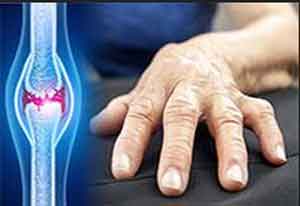- Home
- Editorial
- News
- Practice Guidelines
- Anesthesiology Guidelines
- Cancer Guidelines
- Cardiac Sciences Guidelines
- Critical Care Guidelines
- Dentistry Guidelines
- Dermatology Guidelines
- Diabetes and Endo Guidelines
- Diagnostics Guidelines
- ENT Guidelines
- Featured Practice Guidelines
- Gastroenterology Guidelines
- Geriatrics Guidelines
- Medicine Guidelines
- Nephrology Guidelines
- Neurosciences Guidelines
- Obs and Gynae Guidelines
- Ophthalmology Guidelines
- Orthopaedics Guidelines
- Paediatrics Guidelines
- Psychiatry Guidelines
- Pulmonology Guidelines
- Radiology Guidelines
- Surgery Guidelines
- Urology Guidelines
Vagus nerve stimulation shows promise in treatment of rheumatoid arthritis

Non-invasive stimulation at the external ear improves disease symptoms in patients with rheumatoid arthritis (RA). These findings were first published today in Journal Bioelectronic Medicine.
Rheumatoid arthritis is a chronic inflammatory disease of joints. Commonly it is characterized by pain, swelling and stiffness of joints and is treated using synthetic and biological antirheumatic drugs. However, these medications can result in side effects and may not be effective in all RA patients.
Bioelectronic medicine scientists at The Feinstein Institute for Medical Research collaborated with counterparts from Academic Medical Center at the University of Amsterdam in the Netherlands to carry out a series of pilot clinical studies to assess the effect of a novel bioelectronic stimulation. These studies show that non-invasive stimulation at the external ear improves disease symptoms in patients with rheumatoid arthritis (RA). An emerging field of science, bioelectronic medicine draws on neuroscience, focuses on molecular targets, and deploys bioengineering to tap into the nervous system to treat disease and injury without the use of pharmaceuticals.
In this pilot study, Sangeeta S. Chavan, PhD, Feinstein Institute professor, along with Meghan E. Addorisio, BS, tested the efficacy of non-invasive vagus nerve stimulation to reduce inflammation and improve disease severity in RA patients. They found that bioelectronic medicine treatment was effective in inhibiting the production of cytokines, proteins that mediate inflammation and reduce the inflammatory responses in patients with rheumatoid arthritis.
"Our primary objective was to observe if a non-invasive treatment using an external device will be effective in improving disease severity of rheumatoid arthritis that continues to plague more than one million across the country each year," Dr. Chavan said. "We are pleased to observe that this novel bioelectronic treatment significantly reduces swelling and inflammation associated with RA."
"This clinical research suggests that non-invasive stimulation could suppress inflammation in rheumatoid arthritis patients," said Kevin J. Tracey, MD, president and CEO of the Feinstein Institute, and co-author on the paper.

Disclaimer: This site is primarily intended for healthcare professionals. Any content/information on this website does not replace the advice of medical and/or health professionals and should not be construed as medical/diagnostic advice/endorsement or prescription. Use of this site is subject to our terms of use, privacy policy, advertisement policy. © 2020 Minerva Medical Treatment Pvt Ltd